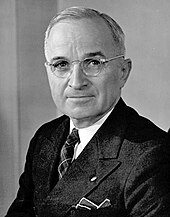Truman Doctrine

A speech was made by U.S. President Harry S. Truman to the U.S. Congress on March 12, 1947. In this speech he said he thought that the United States should help Greece and Turkey to stop them being 'totalitarianists' although he meant Soviet Communism.[1] This became known as the Truman Doctrine. Some historians believe that this was the start of the Cold War.
This speech was made after the United Kingdom said that they would stop helping Greece and Turkey in February 1947 since the U.K. was also poor after the cost of World War II. This meant that Greece and Turkey would still be poor and Truman believed that a poor Eastern Europe would convert to a Communist government more easily unless helped by the United States. Truman wrongly thought that the Soviets were helping the Greek Communist partisans when there was no clear proof.[2]
This plan was a big change to American politics. Political historian Walter LaFeber wrote that 'the doctrine became an ideological shield' which means that he believed that the United States used the doctrine as an excuse or reason.[3] The Marshall Plan came after because of this.
Related pages[change | change source]
References[change | change source]
- ↑ listen and read speech
- ↑ Bradley Lightbody, The Cold War (1999) p.21-22
- ↑ Keely Rogers and Jo Thomas, History 20th Century World - The Cold War (2008) p.24
